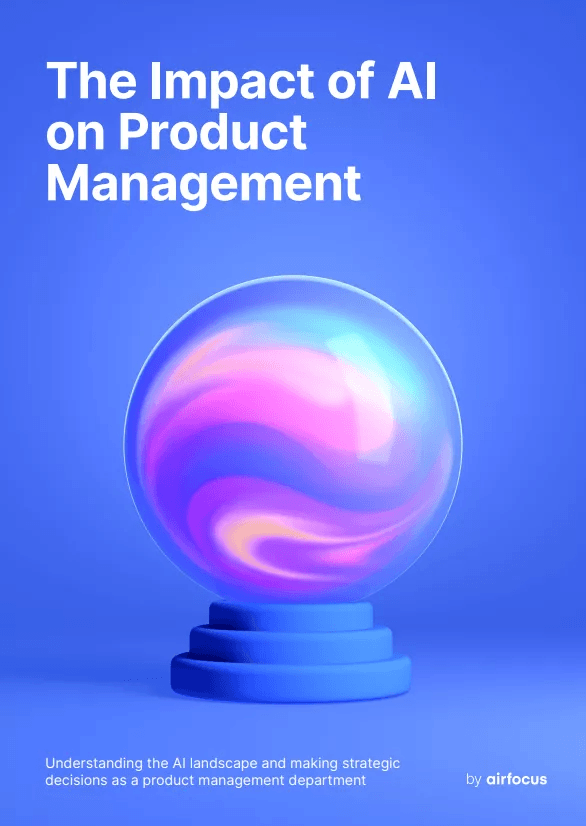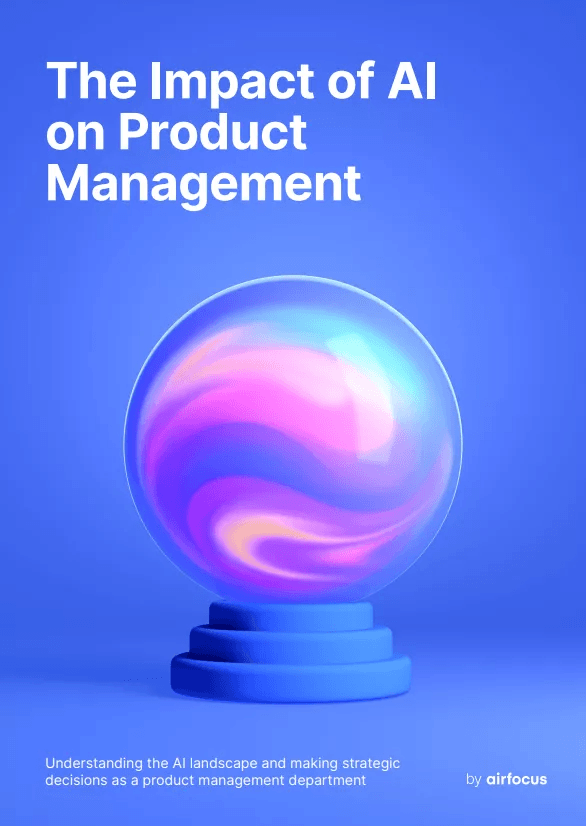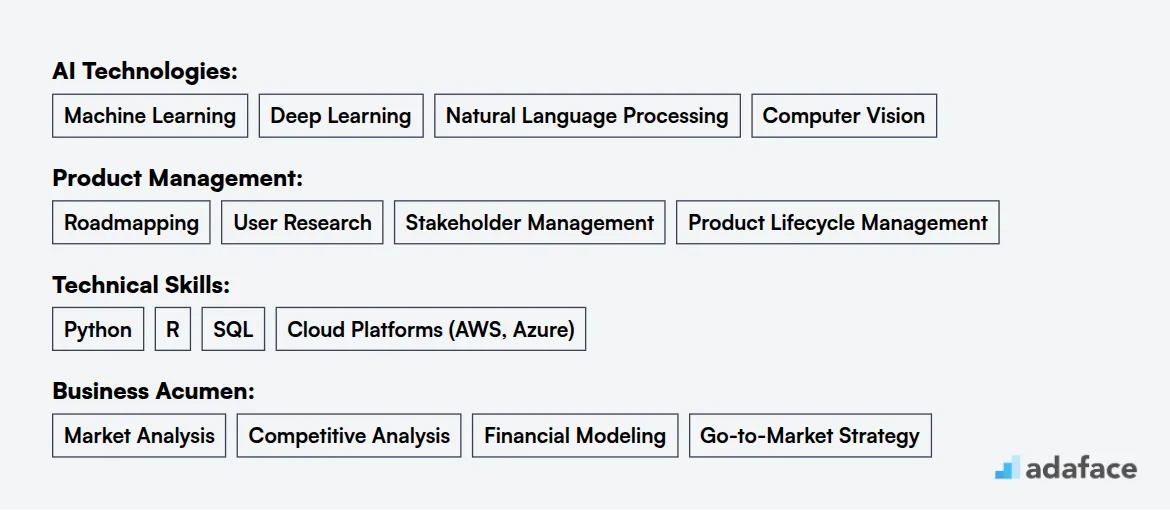Imagine a world where AI not only helps with your morning coffee order but also takes over your job as a Product Manager. As we stand on the brink of a digital revolution, the question isn't just science fiction—it's a reality many are pondering. In this blog post, we'll explore whether AI is here to replace Product Managers or simply transform their roles.
We'll dive into which tasks AI can handle and where human ingenuity remains unparalleled. From automating mundane tasks to enhancing strategic thinking, AI's impact on product management is profound yet nuanced. By the end, you'll understand how to leverage AI as a 'co-pilot' rather than a competitor, ensuring you thrive in this evolving landscape.
Explore this post with:
Table of contents
PMs and AI: What's the Vibe?
Many Product Managers are feeling a mix of apprehension and excitement as AI integrates into their daily work. A study by Airfocus reveals that a striking 70% of PMs worry AI might take their jobs, with 21% admitting they lack the skills to use it well. However, current data suggests AI isn't stealing jobs outright; instead, it's transforming the roles by automating many repetitive tasks.

Credits: Airfocus via Userpilot.com
AI is already handling tasks like writing PRDs, summarizing customer feedback, and generating competitive analyses, freeing up PMs to focus on higher-level contributions like strategic thinking and stakeholder influence. The role isn't disappearing; it's evolving, requiring PMs to adapt and learn new skills, including design and data science. As Valentin Huang notes, AI acts as a "co-pilot," managing execution while humans steer the vision.
Ultimately, the human element - skills such as empathy, creativity, and strategic vision - remains paramount. AI excels at doing what it's told, but PMs are uniquely positioned to direct it, defining what to build and ensuring products meet customer needs. This shift means PMs who leverage AI will be more valuable, focusing on problem-solving and connecting with customers, thereby future-proofing their careers.
What parts of Product Manager jobs will AI replace?
AI is set to transform the landscape of Product Management by automating routine tasks. According to Shobhit Chugh, activities like ticket writing and backlog management can be easily handled by AI, allowing Product Managers (PMs) to concentrate on higher-value strategies. Moreover, generative AI can assist in data analysis, helping PMs make quicker, data-driven decisions, as highlighted in a Forrester report.

Credits: LinkedIn
Additionally, AI tools can facilitate idea generation and project management, streamlining these processes significantly. Lenny Rachitsky emphasizes how AI will impact high-value skills like strategy and data fluency, urging PMs to adapt and learn to leverage AI effectively. While AI is likely to take over many administrative and data-intensive tasks, roles that demand critical thinking and human interaction will remain safe, as these are inherently tied to the PM's ability to lead and inspire.
What parts of Product Manager jobs won't AI replace?
AI handles clear-cut tasks like applying organizational policies with ease. However, Product Managers navigate the tricky 'gray areas' where simple rules don't apply, requiring genuine human judgment and creative problem-solving. For instance, balancing user privacy with generating ad revenue needs more than just logic, as highlighted in a recent LinkedIn discussion.
Beyond problem-solving, PMs hold the strategic reins, imagining the product's future and uniting diverse teams towards a common goal. This involves understanding market shifts and user desires, which AI struggles to grasp without human context. An AI agent might identify data points, but a PM provides the 'why' and 'what next', guiding the product's direction effectively.
How Product Managers Can Adapt to AI
The role of Product Managers is evolving as AI becomes an integral part of product development. According to a16z, Product Managers need to embrace AI as a tool, treating AI models as important elements of product design. By 'interviewing' AI models, PMs can understand their capabilities and limitations—this is key for leveraging AI's strengths in innovative product design.

Credits: CACM
To thrive in the AI era, Product Managers should focus on developing specific skills. As suggested by the Association for Computing Machinery, mastering prompt engineering for generative AI tools is becoming the new literacy. Additionally, PMs should become fluent in low-code and no-code tools to streamline prototyping processes and rapidly iterate on concepts, significantly reducing development time. Understanding AI's fundamentals, such as APIs and data infrastructure, will also enhance their ability to communicate effectively with technical teams.
Current job market for Product Managers in the US
As of now, there are over 134,000 Product Manager jobs available across the United States, reflecting a steady demand in this field. In the past month alone, approximately 106,000 new positions were listed, indicating a vibrant job market. Major companies such as Google, Meta, and TikTok are actively hiring, showcasing the diverse opportunities available.

Credits: LinkedIn
The job market is particularly favorable for experienced candidates, with many roles offering salaries exceeding $100,000. Notably, roles vary across levels, with around 32,449 entry-level positions available. Approximately 16,174 remote positions are also accessible, indicating a shift towards flexible working arrangements. This data paints a positive picture for job seekers in the Product Management space as we head into 2025.
Is Product Manager AI safe?
Product Managers (PMs) are navigating an evolving landscape as AI tools emerge. While many PMs worry that AI might take their jobs—about 70% express concerns about job security—current trends indicate that AI is more likely to enhance rather than replace these roles. AI can automate repetitive tasks, such as writing PRDs and analyzing data, allowing PMs to focus on strategic decision-making and innovation. The shift is not about replacement; it's about transformation, as AI is positioned as a co-pilot for PMs, helping them steer their product visions.

Credits: Airfocus via Userpilot.com
Despite these advancements, key aspects of product management—like customer empathy, creative problem-solving, and strategic vision—remain uniquely human. AI excels at data analysis but lacks the nuanced understanding required for meaningful product development. As highlighted in a LogRocket article, the human element is irreplaceable, making the PM role relatively safe from full automation. Instead of fearing AI, PMs should embrace these tools to enhance their effectiveness and future-proof their careers.
Hiring Product Managers? Here's what to look for
Today's Product Manager isn't just about roadmaps; they're navigating an AI-powered world. Recruiters must look beyond traditional experience to find candidates who can leverage AI tools, understand machine learning, and think strategically about AI integration. This shift means prioritizing adaptability and a learning mindset, as products evolve with data, requiring PMs to manage continuously improving solutions.

Credits: Adaface
To truly screen for these capabilities, use skill-based assessments. The ability to craft effective prompts is key, and Adaface's Prompt Engineering Test evaluates this directly. A broader understanding of AI applications is tested with the Generative AI Test, while the AI Product Manager Test assesses AI concepts, product strategy, and data analysis. These help reduce screening time and ensure you find PMs ready for the AI era.
Prompt Engineering Test
Generative AI Test
AI Product Manager Test
The Exciting Future of AI-Driven Product Management
Looking ahead, the integration of AI into product management presents an exciting frontier where innovation and human insight coalesce. As noted by Egon Zehnder, product managers who embrace AI tools will refine their strategic capabilities, enabling the crafting of user-centric innovations that align with business objectives. This partnership between AI and humanity opens doors to untapped potential, promising a future where products are not just built, but experienced at a deeper level.

Credits: Lummi
For those hiring product managers, AI offers a new landscape of opportunity by enhancing the role rather than diminishing it. AI's ability to handle data-driven tasks allows managers to focus on creativity and empathy—qualities that remain uniquely human. According to Digital Defynd, this collaborative approach will lead to a more dynamic work environment where PMs can leverage their skills to drive meaningful change. The future is filled with possibility for those ready to embrace AI as a partner in progress.

40 min skill tests.
No trick questions.
Accurate shortlisting.
We make it easy for you to find the best candidates in your pipeline with a 40 min skills test.
Try for freeRelated posts



